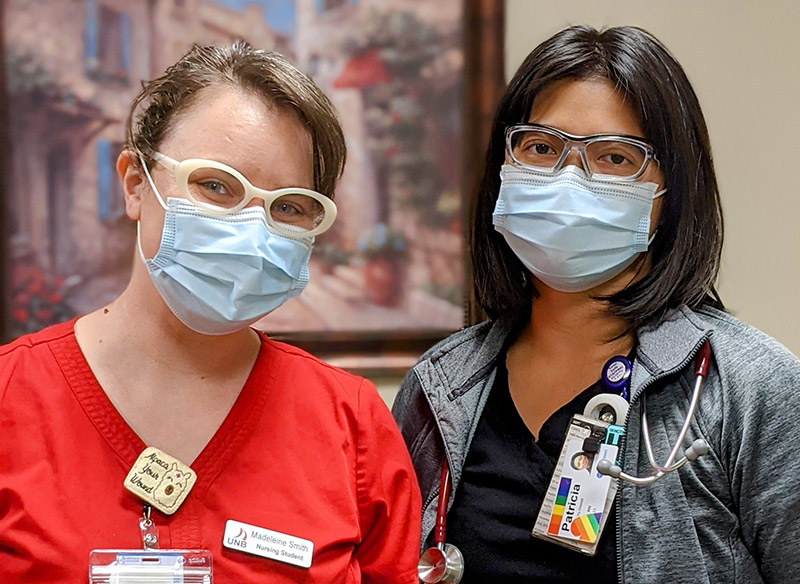Nursing preceptorship an opportunity to learn from mentor in real-world setting
Author: UNB Newsroom
Posted on Jun 11, 2021
Category: UNB Fredericton

Making the shift from studying in a group clinical setting to one-on-one in a preceptorship was a learning curve for University of New Brunswick nursing student Madeleine Smith, but fortunately she had the trust and support of her preceptor.
Smith was mentored by Patricia Yu Howatt, a full-time Registered Nurse at the Moncton Hospital and part-time clinical instructor at UNB, who volunteered to serve as Smith’s preceptor due to their pre-existing relationship. The two had bonded as part of a clinical course, where groups of seven or eight students learn in a real-world setting with the support of an instructor. Their familiarity and trust were assets as they entered their one-on-one preceptorship, where they will spend close to 500 hours together providing care for patients.
“When students are engaged and have the support of a preceptor or mentor, their ability to practice grows exponentially,” says Yu Howatt. “The one-on-one facilitation allows for focused learning. As the course progresses, the students have the opportunity for increasing independence because of the shared confidence between the student and the nurse.”
Smith began the two-year advanced standing program (ASP) at UNB’s Moncton nursing site in September 2019. As a hands-on learner and a mature student with previous work experience, she was looking for an active environment.
“It was really ideal for me to put into practice what we were learning in the class,” she says. “We spend half the week doing our coursework and the other half in a clinical setting.”
Through a variety of clinical placements, Smith learned the foundational pieces of the nursing process – patient care, time management, and communication skills – while expanding her knowledge of various healthcare units. Her experiences include a family practice and stroke unit, a mental health placement in a prison, and working with young families who were expecting or postpartum. Smith even provided support during a few births.
Her coursework shifted during the summer of 2020 when the COVID-19 pandemic required the adoption of alternate delivery methods for teaching and learning. Smith’s community health placement was done completely virtually as her group worked with Monoqonuwicik-Neoteetjg Mosigisig (Under One Sky) Friendship Centre & Head Start Program, developing a culturally relevant digital health guide.
After returning to in-person placements in fall 2020, Smith completed clinical courses on two acute care units, including a cardiac unit with Yu Howatt where the preceptorship is also taking place.
Nurses work together closely, relying on each other to share ideas and ask questions in a fast-paced and challenging environment. Yu Howatt believes it’s important for nursing students to see the dynamic, understand that they’re part of a team and realize they aren’t expected to know everything. Likewise, it’s beneficial for mentors to work with the next generation of nursing professionals.
“The exchange of knowledge is a two-way street,” says Yu Howatt. “As a learner, having a mentor provides the student with much needed support and facilitates a smooth transition in navigating the challenges in nursing. There is a transfer of knowledge and experience that the student can observe and learn directly and vicariously from their mentor. For the mentor, the experience allows for connection with the next generation of health professionals.”
With approaches to care everchanging, relationships between experienced and novice nurses can allow for increased exposure to new ideas, research and teaching.
“The relationship is an opportunity for professional development and encourages the experienced nurse to be up-to-date and current in practice and policies,” says Yu Howatt.
Smith is using her preceptorship as an opportunity to develop her own learning plan, grow her independence, and use the resources available at UNB to transition into the workplace. It’s also a chance for her and her peers to realize what they don’t know and learn to be comfortable with that.
“Even the most experienced nurses will ask each other for advice and review the latest research. You can feel that there’s a culture of learning. It’s really a gift to us to learn from their expertise.”
UNB is committed to supporting the province by providing our students with experiential learning opportunities that make an impact in their chosen fields while they study. Find out more information about becoming a preceptor or clinical instructor with the faculty of nursing.
Photo L-R: Madeleine Smith and Patricia Yu Howatt
